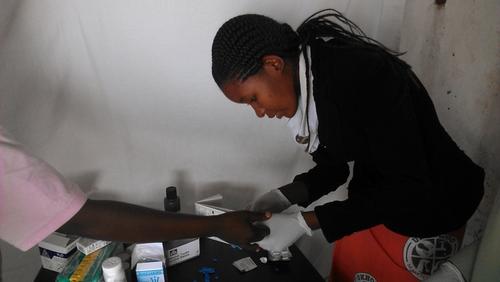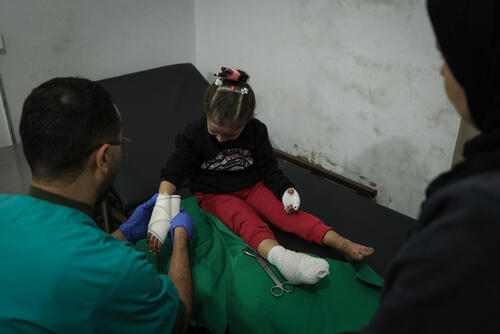Near the end of the second community outreach clinic day, organised specifically for Commercial Sex Workers (CSW) in Nsanje, Malawi, Isabella*, a shy young woman arrives. That day, she and two of her friends are tested for HIV and her test result is positive. Through counseling and encouragement to start antiretroviral (ARV) treatment, Isabella finally admits to the counselor that she already knew she was positive. She had missed two appointments at the hospital ARV treatment clinic and, after this, she had been too embarrassed to go back. Instead, she is taking pills from friends – honestly or dishonestly – to continue her medication. Scared, she came to our clinic looking for help.
The CSW Community Outreach Clinic is part of Médecins Sans Frontières' (MSF) new model of care for CSWs in Nsanje, the southernmost district in Malawi. According to official estimates, the prevalence of HIV among CSWs in Nsanje is an alarming 82%, even higher than the reported national prevalence of 71%. With no local response targeting sex workers and a continuously low supply of condoms in the district, CSWs are a driver of new HIV infections in Malawi and in the district.
Our model of care encourages the CSW to feel comfortable with staff who are there for themRisa Turetsky, outreach nurse for MSF
“Not only is there no special response to the needs of this highly vulnerable group, but also the women feel stigmatised and disrespected when they go to the clinics, especially for treatment of sexually transmitted infections, or STIs,” explains Risa Turetsky, outreach nurse for MSF in Nsanje. “They feel stigmatised by the other patients and sometimes even the clinic staff treat them badly. This discourages most women from coming in for services, which is unacceptable and quite tragic considering the health needs of this group.”
To increase access and acceptability of care and to promote consistent use of condoms and ARVs, MSF is implementing a targeted approach in which Community Outreach Clinics are linked to monthly clinics at the health centre specific for CSWs, run by nurses and counsellors from the Ministry of Health who are trained to be sex worker-friendly. The clinics provide condoms and “Treatment as Prevention,” meaning they treat all HIV+ CSWs regardless of the stage of their disease to decrease their infectiousness and thus prevent new infections.
By the end of June 2013, the first CSW-friendly staff are ready, and two outreach clinics have been implemented. The response has been exceedingly positive, with a 150% increase in sex workers’ visits between the first and second clinic, and comments to the staff about how comfortable they made them feel. The first outreach clinic focused on STI treatment and revealed a striking 66% rate of syphilis among the CSWs who presented. The team treated almost all CSWs empirically for symptomatic STIs. Though simple, one of the most important contributions by MSF is the supply of condoms to the CSWs, considering the district struggles to maintain their supply of condoms, making them unavailable even for these women. The clinic is being run jointly between MSF and the Nsanje Ministry of Health. MSF is focused on capacity building for the staff, as the plan is for the Ministry of Health to run the clinic independently in the future.
The newly trained CSW-friendly counselor traced Isabella when she did not return for care after her visit. Being from the same village, she was able to cross through comfortably and find the girl easily. “Our model of care encourages the CSW to feel comfortable with staff who are there for them,” says Turetsky. These staff members will run the hospital based clinic one afternoon per month, starting in August, specifically dedicated to the sex workers to avoid issues of stigma and poor treatment. As staff develop the clinics in Nsanje ‘boma,’ or town centre, the plan is for MSF to expand these dedicated services throughout the district to keep sex workers like Isabella healthy, by helping them to stay on consistent ARV treatment and to decrease the transmission of HIV overall.
Besides immediate plans to scale up the project to four other commercial regions of the district with large numbers of sex workers, MSF aims to extend this approach to the Southern African region, where CSWs are encountering the same kind of challenges. “In order to have an impact on the epidemic and seriously try to reduce the spread of the virus, we need to start paying more attention to key groups, such as sex workers,” says Rodd Gerstenhaber, country coordinator for MSF in Malawi. “There are many women like Isabella out there and we cannot afford to have them fall through the cracks of a disadvantaged health system.”
* Patient's name has been changed.






